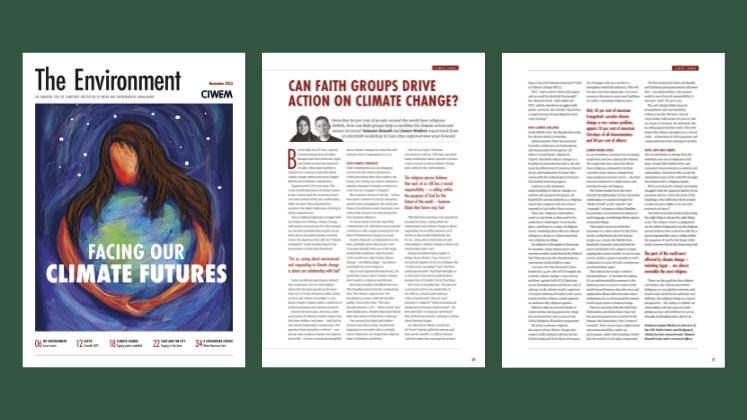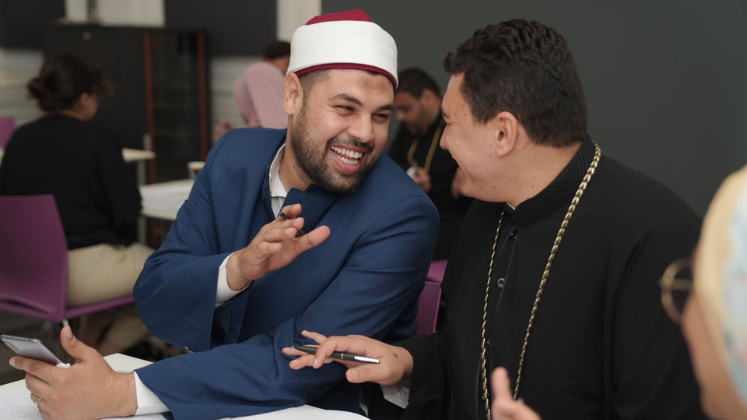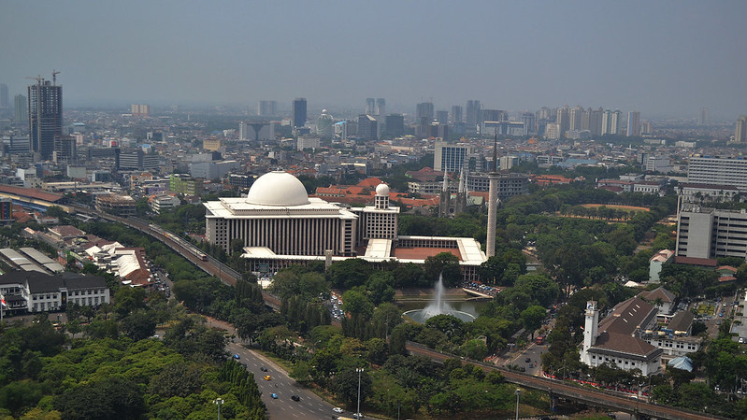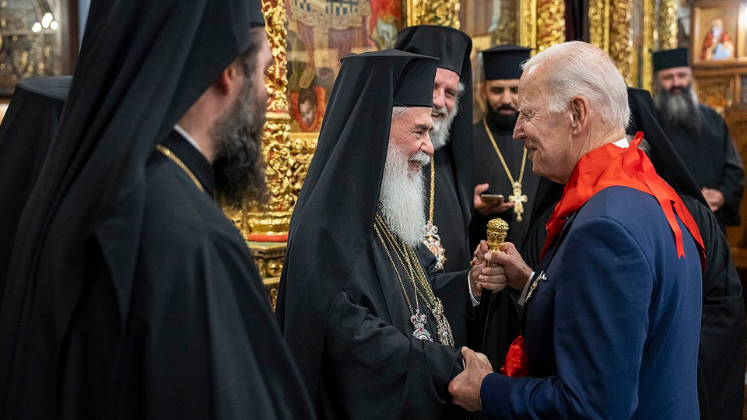This summer, researchers from LSE Religion and Global Society hosted a workshop in Cairo, with Muslim, Coptic, and Anglican leaders, to discuss the disconnect between religious worldviews and the global discourse on climate change. In this article, Revd Canon Prof James Walters and Dr Hanane Benadi tell us more about the workshop.
 This story first appeared in the November 2023 issue of The Environment magazine. Read more here.
This story first appeared in the November 2023 issue of The Environment magazine. Read more here.
Back in July, in 42°C heat, a group of young imams from Al-Azhar Mosque and clerics from the Coptic and Anglican churches gathered in Cairo. They came together to explore how to preach and teach about climate change within and across Egypt’s Muslim and Christian communities.
Egypt hosted COP27 last year. The event raised awareness of climate issues in the country and the recurrent power cuts that turned off the air conditioning while we were there illustrated to everyone the daily challenges of living in rising temperatures.
But as ordinary Egyptians struggle with the rising cost of living, climate change still seems a low priority. It’s often viewed as a western problem that people can do little about and authoritarian countries create the suspicion that talk of a “climate emergency” is just another way for the government to limit their freedoms.
Some workshop participants shared this scepticism. Are we only talking about this because people in the west want us to? Is the situation really as bad as they say? And is it possible to care about climate change under conditions of authoritarianism and extreme poverty?
But for the most part, this was a new generation of religious leaders aware that this issue defines our times – and that its own moral leadership is imperative. The question they wanted to confront – one facing other religious leaders throughout the world – is how to speak meaningfully about climate change in a way that will motivate their congregations to act.
Faith-climate consensus
Faith communities are an untapped resource in the climate movement. Politicians know what they ought to be doing, but cutting our carbon emissions requires changes in human society on a scale that we struggle to imagine.
We need new stories to live by – stories that aren’t centred on ever-accelerating growth and consumption. We need new forms of moderation and constraint, new values that elevate non-material goods over material affluence. It’s these kinds of stories that faith communities tell. And their vast networks of believers offer unique potential for the kind of behavioural change we need.
Despite dramatic secularisation in the west, globally, more than 80 per cent of people identify with one of the main world-faith traditions. And the parts of the world most affected by climate change – including Egypt – are almost invariably the most religious.
But as our Egyptian friends found, the global discourses about climate change don’t speak to religious worldviews.
Recently, Jonathan Freedland wrote in The Guardian about how the terminology that “the climate cognoscenti” use has failed to connect with the broader public, even in the west. “Net zero, decarbonisation, 1.5°C – when tested, they meet blank faces. People either don’t know what they mean or find them confusing.”
Our research in Egypt and Jordan showed that this secular, biophysical language is even more alien to people whose daily lives are shaped by religious ways of thinking and being.
One of our Coptic Christian interviewees told us:
“We have attended many workshops where western scholars come to teach us about climate change and caring for the environment. We find their teaching to be superficial because for them, caring about the environment and climate change is about expanding our worldly existence as if we live in this world indefinitely. But for us, caring about environment and responding to climate change is about our relationship with God.”

Religious leaders have sought to bridge these divides. Pope Francis’s encyclical Laudato Si of 2015 critiques the “technocratic paradigm” and “modern anthropocentrism” that have brought us to this point from the morally holistic perspective of Catholic Social Teaching.
The Pope concluded that “the present ecological crisis is one small sign of the ethical, cultural and spiritual crisis of modernity” that we can’t presume to address “without healing all fundamental human relationships”. He described the “ecological conversion” that all believers need to undergo to bring about lasting change.
An editorial in Nature noted that the Pope’s moral authority among and beyond the world’s 1.2 billion Roman Catholics gives that message far greater impact than the Intergovernmental Panel on Climate Change (IPCC). IPCC “tomes tend to brim with jargon and are read by relatively few people”, the editorial noted. “And unlike the IPCC, which sometimes struggles with public outreach, the Catholic Church has a superb means of spreading the word every Sunday.”
Faith-climate challenge
In the Middle East, the Muslim hierarchy has shown similar leadership.
Addressing the Third International Scientific Conference on Environment and Sustainable Development, Al- Azhar’s Grand Imam, Ahmed Al- Tayyeb, described climate change as a biophysical phenomenon that’s also the latest manifestation of centuries of moral decay and domination of nature that comes with the technological advances that fuelled western progress.
Contrary to the dominant understanding of climate change as a sudden and unexpected rupture, he framed the current moment as a religious ordeal that requires each one of us to respond to God rather than to nature.
That said, religious communities aren’t as top-down as they used to be. Authority is challenged. Social media gives a platform to a range of religious voices, including those who see climate change as a hoax or a distraction from core religious teaching.
For millions of Evangelical Christians, for example, rising temperatures and extreme weather events herald the biblical End Times in ways that should make us concentrate on the world to come.
Last year, the Pew Research Center found that 34 per cent of US evangelicals consider climate change a very serious problem, against half of US Christians across denominations and 88 percent of atheists. In the Islamic world, suspicion of western-influenced leaders still creates scepticism that climate action supports an authentically religious agenda. Which is why we need the kinds of conversations among grassroots clergy that we hosted in Cairo as part of our Global Religious Pluralities programme.
We want to nurture religious discourses about climate change that connect with ordinary believers in the Global South and draw those discourses into dialogue with one another to strengthen interfaith solidarity. This will become ever more important, as scarcer resources threaten to open new faultlines of conflict, including religious ones.
Climate moral codes
In our workshop, we noted two recurring suspicions and two constructive themes. The suspicions were ones that divide these religious communities in their concerns about climate change from some dominant western voices – the dual western tendencies to deify nature and entirely decentre the human.
The former manifests in the move towards the philosophy of Gaia, becoming commonplace to speak of respect for “Mother Earth” as she “speaks” and “responds” to human activity. Muslims, in particular, see potential for idolatry in such language, transferring divine agency to material things.
This played out in social-media responses to a short report by Sky News Arabia on the floods that hit Europe in July 2021. Across the Middle East, hundreds of people criticised how the report attributed God’s anger to nature, arguing that nature doesn’t act on its own accord. Rather, nature responds to God’s command; it is part of God’s creation not an independent agent.
This reflects the secular activist’s second tendency – to decentre the human. It’s an understandable response to the Anthropocene to recover a sense of the world beyond human objectification and exploitation. Many believe we must enter a posthuman era, or at least grant the natural world equal status to human beings.
This sits uneasily with the belief that Christianity and Islam share: that God has special purposes in creation for the human; that humanity is the “crown of creation”. How can we reject exploitation and unsustainability, asked our participants, while still retaining a belief that the world is God’s gift to humanity?
The first constructive theme the Muslim and Christian participants shared addresses this – our relationship to the natural world is one of moral responsibility. It isn’t just “stuff” for us to use.
We can’t simply think about its management and sustainability technocratically. We have a moral relationship with nature because it, like us, is part of creation. It’s endowed, like us, with purposes by the creator. That view frames the climate emergency as a moral crisis – a distortion of God’s purposes and commandments in the ordering of our lives.
Faith, hope and climate
The second theme to emerge from the workshop was one of endurance and hope. People felt bewildered by and concerned about western eco-anxiety and antinatalism. Even those who accept the existential nature of the crisis felt strongly that despair isn’t a religious option.
We’ve seen how the climate movement struggles with the apparent futility of our personal choices. Given the scale of the challenge, what difference does it make to take one more flight or for one less person to eat meat?
The faith-based take on this is that doing the right thing is always the right thing to do. The climate crisis is a judgement on the whole of humanity, but the religious person believes that each of us still has a moral responsibility and a calling within the purposes of God for the future of the world, however bleak that future may feel.
These are the qualities that religion can bring to the climate movement. Religions are vast global networks with leaders who wield moral authority over millions. But religion brings us a moral imagination – the ability to rethink our relationship with the natural world – giving us hope and resilience to see us through challenging times ahead.






What an excellent article! There is a lot faith-communities are doing in the UK too, in terms of Environmental Education.
Thank you!